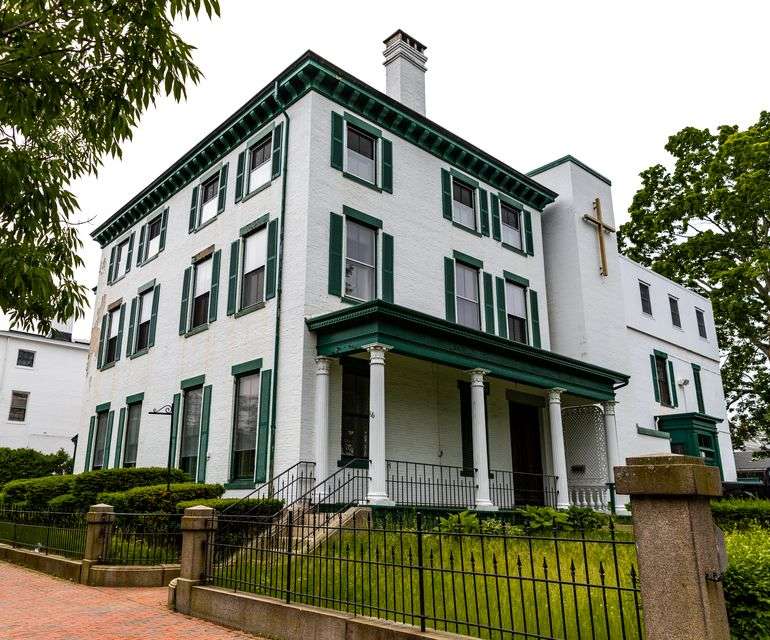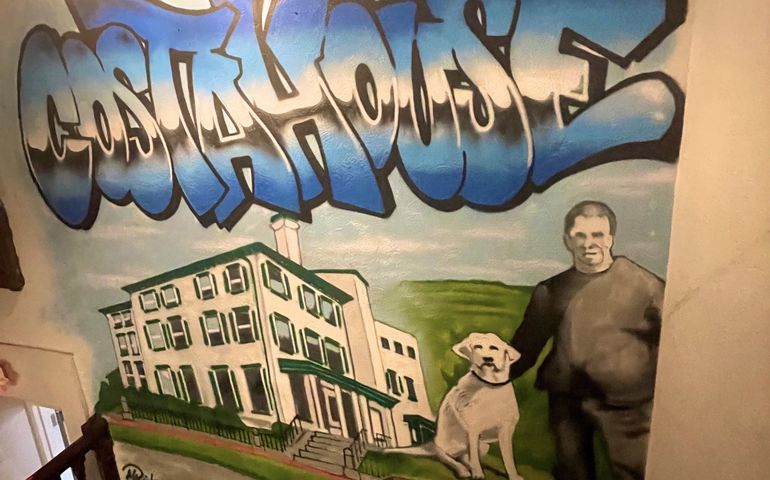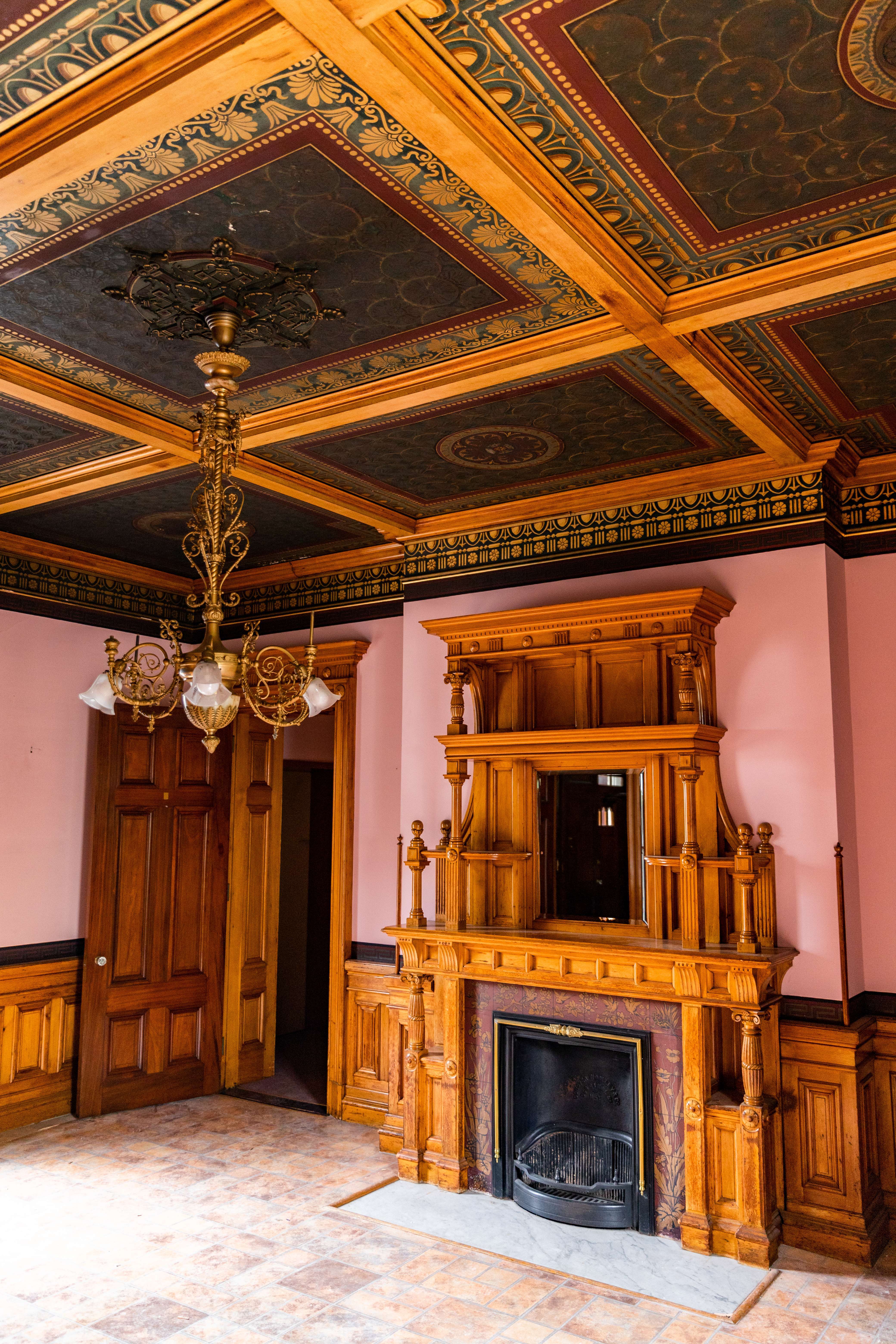
The Portland home built for Maine's first Chief Justice will house nonprofit services provider
 Courtesy / GREATER PORTLAND PEER SERVICES
A mural that depicts the early 19th-century building decorates a stairwell at 160 State St.
Courtesy / GREATER PORTLAND PEER SERVICES
A mural that depicts the early 19th-century building decorates a stairwell at 160 State St.
After 18 months of redevelopment, a former nunnery in Portland's West End has been redeveloped for lease by Greater Portland Peer Services, a peer-run agency designed to improve health outcomes and supplement traditional mental health, substance abuse and health care services.
Greater Portland Peer Services took the lease at 160 State St. with the property’s new owner, Champlain LLC, which bought the property for $3.35 million.
The seller was Josh Soley, the founder and president of Maine Realty Advisors, who also invests in and redevelops real estate.
Soley and Tim Millett of Porta & Co. brokered the deal.

"We like the peer support model; we like the rooming house layout,” said Ben Skillings, founder and executive director of Greater Portland Peer Services. “It makes sense for what we do, because a lot of folks are not ready for their own apartments.”
The seller
Soley bought the property in 2019 for $1.66 million and put $1.221 million into it, in construction and soft costs, during a total development process that took 30 months.
The original goal of the development, said Soley, was to house asylum-seekers who had been stationed at the Portland Expo Center in 2019. Soley said he pivoted the model due to permitting and construction delays during the pandemic. Skillings suggested the alternative use by this nonprofit.
Soley and Skillings said they’ve known each other for about a decade. Skillings credited Soley for his help in finding leases for the nonprofit’s programs and finding apartments for clients who are ready for independent living.
“Josh has been very helpful in supporting our mission,” Skillings said.
1807 nunnery
The three-story, 13,000-square-foot Greek Revival building dates to 1807 and was a private residence for Prentiss Mellen, a Massachusetts native who settled in Portland around 1806. He became a U.S. Senator for Massachusetts — serving from 1818-1820, resigning when Maine becoming a state in 1820. He was the first chief justice of the Maine Supreme Judicial Court.
Two centuries later, the building still features original handcrafted ceilings and other historic architectural elements, including Italianate doors, stained glass windows and ornate carvings.
The house was later the home of William Pitt Fessenden, a Maine legislator and U.S. Senator who served as Secretary of the Treasury under President Abraham Lincoln.
For 84 years, it served as home of the Sisters Adorers of the Precious Blood, a contemplative, Catholic religious order. The building originally housed up to 14 sisters. But in recent years, the order declined to two sisters. Soley bought the property when the two nuns moved to the Monastery of the Precious Blood in Manchester, N.H., where the order was founded.

Now, under new ownership, Greater Portland Peer Services has been operating there since Jan. 1.
The redevelopment cost just over $1 million in an interior fit-up that converted monastery spaces into 38 single-occupancy rooms. New mechanical systems were installed.
“It was pretty substantial,” said Soley.
The project was financed by Androscoggin Bank.
The tenant
Skillings said Greater Portland Peer Services was established about a year ago.
“All of our employees and volunteers are in various forms of recovery from mental health and/or substance use disorder,” he said.
The agency develops and operates outreach, supported housing and fluid programming that serves the most vulnerable in the community.
All of the programs are staffed 100% by peers — people in recovery — and are designed to improve health outcomes and supplement traditional mental health, substance abuse and health care services.
The programs include Maple Street Housing First for Men and Homes for Men and Their Children — both of them peer-supported housing projects.
“We try to house folks who historically haven’t been able to maintain their housing for whatever reason, people who have nowhere to go,” Skillings said. “We try to house them and connect them with services and we try our best to keep them housed.”
The nonprofit has additional peer-supported sober living, outreach, detox and recovery navigation programs.
The 160 State St. location is now the nonprofit’s flagship, he said.
Together the nonprofit has 100 beds in its network and is looking to grow. Within three days of 160 State St. opening, its 38 beds were full.
“There’s a huge, huge need for housing,” Skillings said. “That’s something we want to provide.”
Clients can stay with Greater Portland Peer Services housing for as long as they need to, as long as they follow the rules.
Goals for clients include helping them transition to their own apartments with support from the staff.
The need is huge, said Skillings.
“I don’t think a shelter is the solution,” he said. “We need to focus on housing folks first and then helping them afterward.”
The focus at 160 State St. is to support young adults who are homeless, he said. Many are attending school, working, or applying for citizenship. Skillings said he thinks most will be able to transition to independent living within 12 to 18 months of first entering the facility.
“This will be our hub and the model as we begin to show that peer-supported housing does work in helping people, that it can help them gain independence,” he said. “We want to mimic this model with different populations.”
He added, “These are all projects that need time, patience and experienced support staff. It’s not easy, but that’s what we’ve been doing and that’s what we’re going to do more of.”













0 Comments